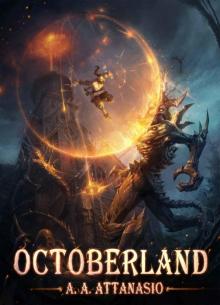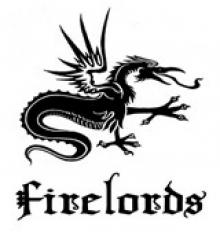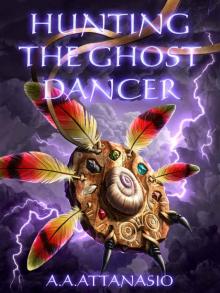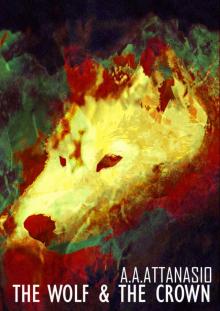- Home
- A. A. Attanasio
Wyvern
Wyvern Read online
Wyvern
A. A. Attanasio
published by A. A. Attanasio
Copyright © 2012
http://aaattanasio.com/
Cover Art and Interior Illustrations:
Jeff Bigman
www.bigmanart.com
For your father and mine —
and their journeys exiled in us.
When people die there awaits them what they neither expect nor even imagine.
— Heraclitus, frg. 27
Contents
Walking with the Beast That Walks in Us
Wyvern and The Fateful Sisters
Sleeping with Satan
The Moon Is a Horn We Blow with Our Last Breath
Part One:
Walking with the Beast That Walks in Us
The Lord has said that He would dwell in thick darkness.
— Solomon
Dawn built a temple of clouds above the jungle. The north wind, tangled with stars, blew west, and the clouds followed into the mountains. A sudden, brief torrent crashed over the peaks, clattering across ledges of black slate and rushing down rocky slopes toward the forest.
On a mountain ledge where the deluge tattered to misty veils, a narrow figure stood, peering down at an immense maze of crooked chasms. The enormous vista swarmed with vapors, valleys exhaling like graves.
The mighty cumuli lifted and vanished in the purple sky among the last wind-shaken stars, and the slim shadow stepped from the cliff darkness into dawnlight. Black and angular, he wore only a snakeskin loincloth. The flesh of his chest and shoulders beaded like tar where ritual scars linked their proud stories. Serpent tattoos coiled up his legs, and on his flat head bristly hair braided viper loops. His breath smoked violet in the cold light.
The mansnake scanned the terrain below until he spotted the high valley where the giant trees of the forest came to their knees before the stone peaks. There, a day's hike away, a demon dwelled. For seven years, the mansnake had watched this valley to see that the demon did not escape, and he had entered the glen to bring offerings only when certain that he would not be seen. Lately, the drum songs of neighboring tribes spoke of sighting the dread creature, and the time had come for the mansnake to go down from the cold paths into the hot frenzy of the jungle and confront the demon.
The sun climbed the sky as he descended the planet's wall. Ahead, bald outcroppings of rock loomed and twisted pygmy trees squatted among cobbles and boulders. Farther down began the flower fields, knolls and braes drumming with color as the upsailing mists dispersed in sunlight. Ferns walled the forest where the big trees towered, at the top of the demon's valley.
The valley was dark. Here and there, where trees had fallen, sunlight lanced the dense canopy and ignited flights of tiny emerald birds and swarms of blue butterflies. Even as the sun mounted to noon, gloom persisted in this deep vale, and the tocking of frogs teemed in the famished light.
On the far side of this dusky valley, naked children, boys of the migrant Rain Wanderer tribe, splashed in the amber water of a stream. Their camp lay beyond a grove of thornbark trees. Several days ago, a foraging party had glimpsed the demon that lived in the mountain-shadowed valley. The women who spied it declared that the demon had taken the form of a child, but with poisonous moonflesh, sunfire hair, and eyes blue as stars. The men would not talk about it, so the bravest of the boys had set out to see for themselves. In a clearing at a bend in the stream, they had found a run-off pool free of crocodiles, where they could frolic without fear of being swept away or eaten. Yet no one forgot that this pool belonged to the demon. The fretful cry of every bird and monkey stalled their games and brought them apprehensively to their feet, ready to dash back to their mothers, foraging for the evening meal along the forest paths Each time, the eldest child laughed at the fear of the younger ones and pointed to the animal that had cried.
Among the rubbery leaves above the stream, the demon watched. A young boy, he seemed to glow in the shadows. His blond hair, bowl-cut and greased with nut paste, shimmered like sun-beaten metal, and his smudged skin leaked light. Only the cast of his bones looked visibly tribal. His face had the feline contours of the children he watched, but from under his native brow span, blue eyes stared.
The boys in the stream, all about his age, captured his fascination with their waterplay. Their laughs and shouts wove a new music. Never before had he seen children playing. For the seven years of his life, he had lived in the valley alone with Mala, his mother. Only lately had he heard the drum songs of the Rain Wanderers and been inspired to defy Mala's warnings and hike the length of the vale to find the music. He had seen the Rain Wanderers' camp from a distance and had followed the women as they gathered berries and kindling. Today was the closest he had ever come to the tribesfolk. Now he was certain: they were no different from him.
He heard a frightened cry of "Demon-child!" and one of the children pointed to the underbrush. The oldest child rushed forward while the others cringed. A termite-riven log rolled into the mud shoals to the frenzied chant of "Demon-demon-demon-child!"
The boy crouching in the brush frowned. He knew they called to him. The previous day, when the women had spotted him peering through draperies of pea vines, they had shrieked, "Matubrembrem — demon-child!" and run away.
Mala called him Jaki. She had told him that his father came from a far-distant land, as had her father, and that they lived apart from the tribes because their fathers' spirits belonged to other lands. He could not see now why he should be called a demon for who his father was.
Jaki wanted to explain this to the taunting children, but he had promised Mala that he would not show himself, and reluctantly he stepped back, determined to find out why the spirits of their fathers could find no home in the tribes. As he turned to go, his foot snagged on a root, and he pitched forward. Arms outstretched, he crashed through the screen of leaves and tumbled down the streambank.
Screams jumped from the children in the pool at the sight of the monster flying at them. They fled in panic, clutching at dangling vines to pull themselves up the bank. Only the oldest of the children, the one who had laughed before at the others, stood fast. He was not laughing now. While the others clambered up the embankment, he returned the demon's stare. He observed that the creature was but a boy, wearing a bark loincloth like other boys, but that his flesh, hair, and eyes were born of fog and sunfire. He picked up a river cobble and edged into the stream.
"Ferang! Come back," the children called after him. He advanced heedless of their cries. Jaw set, white-knuckled fingers clasping the stone, he moved sideways toward the demon and kicked his foot through the water to startle the repugnant child.
Jaki did not move. Their terror confused him. What frightened them? Could they not see that he was no different from them? And who was this one called Ferang who raised a stone to him as if he were a viper?
"Put that rock down," Jaki called out. "I will not harm you. I am a boy like you."
Ferang halted his advance and shook his head. "You cannot fool me. I know who you are, Matubrembrem. Be gone!" he shouted, and let fly the cobble. It hurtled straight for Jaki, and the golden-haired boy ducked. The stone glanced the side of his head, and his vision flared blind. The impact knocked him into the mud. Ferang hooted and ran back to the gravel bar for another rock.
Jaki's sight jarred back into place, and he touched the pain. His fingers came away hot with blood. He staggered to his feet, starpoints swimming around him, and collapsed. Dizzily, he crawled up the mud slope as the emboldened children pelted his back and legs with rocks. On hands and knees, he scampered into the brush, lunged to his feet, and dashed with all his might into the dark valley.
Stunned and frightened, Jaki darted like an animal through the pillared gloom. He had never been
struck before, and the stoning left him mindless with shock. He ran until exhaustion tripped him, and he flopped into the leaf-moldering shade, heaving for breath. His jumping heart shouted, "Matubrembrem — demon-child — demon — " Pain raged in his head. Above him, a starved-faced monkey laughed derisively. Its cackle twisted in his booming ears to "Matubrembrem!"
Jaki rolled to his feet and ran again, exploiting all the strength left in his child legs. A cove of pink birds flapped up from the sepia darkness screeching "Matubrembrem!" An opossum leaped away from his reckless flight with a mocking squeal.
Fatigue dropped the boy again, this time under the prop roots of a cobwebbed tree. Alone at last. After catching his breath, he gently explored the wound at his temple and found it to be slight. He rose and walked on, befuddled and angered by the hostility of the children. Was he truly a demon-child? Had his mother lied to him then? He hurried through dank shadows, swiping angrily at vines and saplings in his way, anguish mounting, until the land began to climb and the heat of the jungle relented. Mala's whistle chimed from the clearing where they lived. Until he heard her voice, he had thought his pain was taking him to her. Now he realized that he could not face her yet.
Jaki continued through the forest, the leaf mulch underfoot becoming rockier, air cooler and braced with resin scents. By midafternoon, he had climbed to the back of the valley where the jungle thinned and ferns unfurled their plumes. He stepped out of the forest under the open sky and winced against the bewilderment of clouds and the sudden sun.
Rhododendron fields soared up the steep slopes, groggy with pollen. Beyond the ranges of flowers, Mala had forbidden him to go. The broken rock pitch of the higher elevation fronted the domain of spirits. Jaki breathed in spirit power. Blossoms mixed their ethereal fragrance with the lonesome, pungent camphor of wind-rubbed rock. The granite slabs above indeed looked haunted: feldspar veins and amber patches of lichen outlined hideous faces. Always before, those evil stares imprinted in the rocks had kept him away. Now he climbed toward them, heedless of his mother's calls as she shouted after him from their grass house in the glade below.
He did not look back until he reached the jumbled slabs. Mala's cries had dimmed away by then, and when he looked down from this height she appeared as but a grain of color. All around her, the world floated in vast green swells as far as he could see. Blue smoke rose from the Rain Wanderers' camp. Egrets winged north over dense hills, and at the far side of the sky, the sun burned like a white star above a line of lakes.
Jaki climbed toward an island of tundra, and that exertion spent the last of his hot emotion. When he sat down on a rock shelf among pink tufts of grass, the peacefulness of fatigue soaked him. Who was he that others loathed him as he loathed the krait? He looked around for the evil faces that had stared back at him as he had gazed up from the jungle. Nothing here but loose black rocks splattered with silver lichen. He was the only demon to be found.
Jaki put his fingers to his face and outlined the world inside him. The mirroring touch on the dull bones witnessed the love of his parents — the hollows in his cheeks where his father lay down with his mother, and the jut of nose between the eyes where they stood up again. Mala said that he looked like his father. The old sorrow for that golden-haired man lit up as he traced the tall forehead so unlike his mother's narrow brow.
His fingers fell away, and he spoke aloud the name of his father, "Pieter Gefjon." The name sounded beautiful in the cold, a name made for the wind. He hugged himself against the icy breeze breaking over the rocks and remembered his mother's story of how his father had caught the wind with sails and voyaged in a big ship across the sea. Because he had never seen the sea, a ship, or the wind stretched out to a voyage, Mala had built a toy boat from a coconut husk and a shred of nipa palm and they had sailed it on the green pond near their home.
Happy thoughts of his mother, the cold rivering from the peaks, and bristling hunger stood him up. He surveyed the confused tangle of ranges and valleys beyond the familiar dale where he lived. He would journey those distances someday, he promised himself, just as his father had. The tribes that believed him a demon he would leave behind, and he would travel with the weather over the horizon until he found his father's people. This determination softened the humiliation of his head wound and bruises, and he began the steep trek home.
From above, sheltered by a brash of jagged black granite, the mansnake watched Matubrembrem descend toward the jungle. With a hand flexed to a claw, the sinewy man carved a sigil in the air to ward off the demon-child's invisible radiance. And then, like black smoke spilling down the broken slopes, he followed.
*
"Pirates!" a voice cried from the crow's-nest.
The shout from the top spun the captain on the heels of his cordovan boots. Pieter Gefjon, a gaunt, bearded man in blue knee breeches, ruffed blouse, and wide-brimmed captain's hat, stood on the quarterdeck staring hard into the glare of morning. The Makassar coast of Celebes filled the eastern horizon. Along the shoreline slurred with mist, jumbled green masses of mangroves hunched. Waterfalls laced gigantic cliffs. Squinting against the barbed sunlight on the water, Gefjon could discern the distant mountains of Celebes. Pinpricks of light jiggled in the air. When he held his hand before his eyes and stared through the slit of his fingers, he spotted the pirates.
Three djong — Javanese junks — tacked toward him. With their dragonhead bulwarks, the ships had the swayback look of breaching sea serpents. Their green lugsails signified a Muslim vessel and no friend of a Dutch trader like Gefjon's Zeerover. "Lanun," the captain muttered.
The Lanun, the fiercest pirates in Indonesia, regarded their Muslim faith as merely a convenience, left over from the jihad that had conquered Asia centuries before, and there remained nothing holy about them. Gefjon knew from other captains who had hunted the Lanun that they topped their masts and bowsprits with the skulls of their victims. He looked for and spotted white flashes of bone among the spars.
The captain reached in the pocket of his long coat for his Bible and began to pray. God knew his need. By 1607 the Dutch had been in Asia twelve years, Pieter Gefjon a captain in these alien waters from the first. In that time, his life had become a prayer — first to bring home glory to match the honor of his father and brothers who had fought in Europe to win their country's independence from Spain. That prayer had died cruelly at Java in his first year as a young captain during the infamous Bloody Armada. Gefjon's admiral had razed Jakarta for refusing the Dutch suzerainty, and Gefjon's man-of-war had sunk scores of paper-sailed djong attempting to flee the burning city. The screams of the drowning curdled his prayer for glory. Since then, he had lived only to bring useful goods to the native peoples in trade for the raw treasures of creation they ignored or hoarded for their forlorn gods.
The captain continued to gauge the speed of the predators gliding out of the blinding east. The lighter djong closed fast. He flew west and searched ahead at the jungle-strangled cliffs of Borneo for a cove where he could stand off his attackers. Few European eyes had seen this garish coast. The maps described Borneo as a green desert, surrounded by dangerous shoals and infested with pirates. Gefjon emptied the dread in his lungs with a loud sigh. The maps had merit.
Zeerover, a flat-sterned, round-bellied cargo ship, was the first Dutch vessel to sail the eastern coast of Borneo. The eighty-foot, three-hundred-ton fluit had been lured into these treacherous straits by the promise of diamonds big as walnuts in the silt of the Mahakam River, the Eater of Men.
The promise had been tendered by a fierce, square-jawed man with ear lobes like pulled taffy and sharp red tattoos on his throat and the palms of his hands. Without a lash of hair on his face, Batuh's harsh mien glinted with perspiration. Sea travel sickened him, and he lay on the quarterdeck, beige with nausea, staring at the captain.
"Why am I here?" Batuh muttered under his breath as his gorge jostled with the roll of the ship. "I am a Tree Haunter. Tree Haunters have no boats. We are hunters. I do not belong
here."
"Larboard reef!" a sailor cried from the foremast, and Zeerover lurched as the pilot leaned into the whipstaff.
Batuh moaned. "This must be the curse of the wise crones of my village, staring through me with one eye because I pleased myself among the women without marrying! They are laughing now! Batuh, Taker of Heads! Ha! Courage, Batuh! Here comes Death flashing on the reef. Courage, now! I am already dead — dead two years now, since the chief took my weapons and exiled me to the jungle for killing his holy pig. Exile has led me to this. So now I will die again — and I am not afraid. Just sick."
He could no longer watch the sailors dangling among the clouds or scuttling over the tilting decks, readying Zeerover for battle. He closed his eyes, trying to soothe his queasiness with memories of the many heads he had taken from rival tribes to nourish the fields of his people. Once, during a long drought, he had dared to journey far from the Tree Haunters' realm of the blue butterfly, north, beyond the fog creeks and turtle pools, beyond the shining brow of the eagle cliffs, seeking a stronger life force to revive the exhausted paddies. From among the strangely tall and fair-skinned people of the north shore, he took three heads and captured a girl. On his return, the rice grew thick and the hunting proved easy.
The girl called herself Malawangkuchingang — Bright Air between the Palms — and though she appeared ugly to the Tree Haunters for not shaving her eyebrows or stretching her ear lobes or cutting her long hair to the bowl shape beautiful to the forest people, she had power over Batuh. He tolerated her ugliness, because she had seen the big ships and the red-faced, large-nosed men who sailed them, and she enthralled him with tales of gleaming swords stronger than the finest-honed ironwood weapons. She spoke, too, of thundersticks that killed at a distance far greater than arrows. Indeed, she claimed that she herself had been fathered by one of those godly men, who had entrusted her to the care of a priest before returning to the sea. From the holy man, she had learned the gods' language, their faith, and many of their secrets, which she shared with Batuh for sparing her life.

 The Conjure Book
The Conjure Book Servant of Birds
Servant of Birds The Eagle and the Sword (The Perilous Order of Camelot Book 2)
The Eagle and the Sword (The Perilous Order of Camelot Book 2) Wyvern
Wyvern The Last Legends of Earth
The Last Legends of Earth The Dark Shore (The Dominions of Irth Book 1)
The Dark Shore (The Dominions of Irth Book 1) Octoberland (The Dominions of Irth Book 3)
Octoberland (The Dominions of Irth Book 3) Arc of the Dream
Arc of the Dream p1b6fn7sdh1ln0g4v1pkvkuqim54
p1b6fn7sdh1ln0g4v1pkvkuqim54 Hunting the Ghost Dancer
Hunting the Ghost Dancer The Wolf and the Crown (The Perilous Order of Camelot Book 3)
The Wolf and the Crown (The Perilous Order of Camelot Book 3)